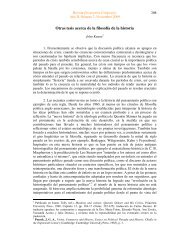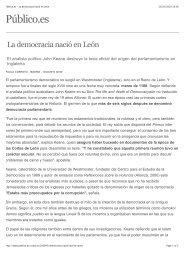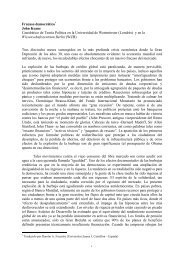Alexandre Koyré, 'The Political Function of the Modern Lie ...
Alexandre Koyré, 'The Political Function of the Modern Lie ...
Alexandre Koyré, 'The Political Function of the Modern Lie ...
Create successful ePaper yourself
Turn your PDF publications into a flip-book with our unique Google optimized e-Paper software.
Ladies and Gentlemen,<br />
I‟d like to convince you in this lecture on lying - truthfully, <strong>of</strong> course, to your face,<br />
without a word <strong>of</strong> a lie - that we live in times <strong>of</strong> rising sensitivity among publics to<br />
lying and that, in consequence, some old and vitally important perennial questions to<br />
do with lies and truth and power and <strong>the</strong> role <strong>of</strong> journalism in a democracy are making<br />
a comeback. Inspired by a recent range <strong>of</strong> global controversies, for instance to do with<br />
weapons <strong>of</strong> mass destruction, WikiLeaks and climate change, pseudology is suddenly<br />
fashionable and commentaries on <strong>the</strong> subject <strong>of</strong> lying are flourishing. It has become<br />
conventional to quote <strong>the</strong> work <strong>of</strong> Plato on noble lies, or Kant‟s discussion <strong>of</strong> whe<strong>the</strong>r<br />
it is justified to save <strong>the</strong> life <strong>of</strong> a friend by telling a lie (he didn‟t approve <strong>of</strong> that), or<br />
more usually to draw upon <strong>the</strong> writings <strong>of</strong> Hannah Arendt stimulated by <strong>the</strong><br />
publication <strong>of</strong> <strong>the</strong> Pentagon Papers. But it was <strong>the</strong> Russian-born philosopher and<br />
historian <strong>of</strong> science <strong>Alexandre</strong> <strong>Koyré</strong> who was <strong>the</strong> first contemporary writer to pose<br />
new questions about <strong>the</strong> activity <strong>of</strong> lying: to ponder its changing historical<br />
significance and to emphasise <strong>the</strong> potentially catastrophic consequences <strong>of</strong> political<br />
lying in <strong>the</strong> age <strong>of</strong> media-saturated democracy. 1 His treatment was not only careful,<br />
sophisticated and unsettling. Its strengths and its weaknesses should ensure that it<br />
retains great relevance today – or so I hope to show.<br />
Most people don‟t know his work, which is a pity, since <strong>Koyré</strong>‟s approach was<br />
certainly distinctive. It was first sketched in a 1943 essay conceived when working in<br />
Cairo, „Reflexions sur la mensonge‟ (translated into English and published in New<br />
York in <strong>the</strong> summer <strong>of</strong> 1945). His starting point was a provocation: since human<br />
beings are equipped with <strong>the</strong> capacity for embodied speech <strong>the</strong>y have a remarkable in-<br />
built capacity to „say what is not so‟. Lying is an intentional act <strong>of</strong> obfuscation, and it<br />
takes many varied forms, scattered through a range <strong>of</strong> settings, extending from <strong>the</strong><br />
intimacies <strong>of</strong> everyday life through to powerful institutions <strong>of</strong> government and<br />
business. Sometimes <strong>the</strong> buncombe humans utter is motivated by playfulness, said<br />
just for <strong>the</strong> fun <strong>of</strong> it. (The Beatles smoked a joint in <strong>the</strong> toilets at Buckingham Palace<br />
before <strong>the</strong>y received <strong>the</strong>ir MBEs in 1965. They didn‟t: <strong>the</strong>y smoked cigarettes.) At<br />
1 <strong>Alexandre</strong> <strong>Koyré</strong>, „The <strong>Political</strong> <strong>Function</strong> <strong>of</strong> <strong>the</strong> <strong>Modern</strong> <strong>Lie</strong>‟, Contemporary Jewish Record, volume<br />
8, number 3 (June 1945), pp. 290-300; and „The Liar‟, Philosophy and Phenomenological Research,<br />
volume 6, number 3 (1946), pp. 344-362.<br />
2





